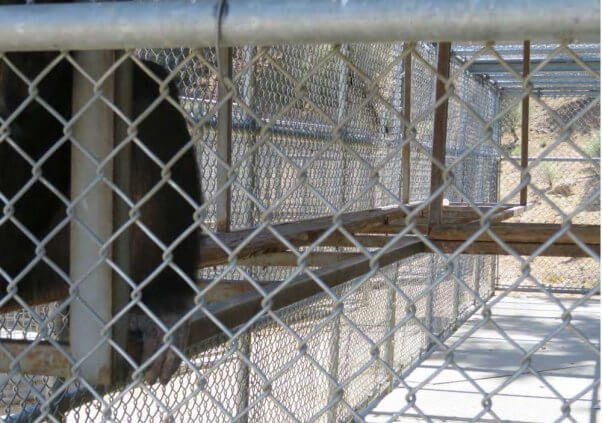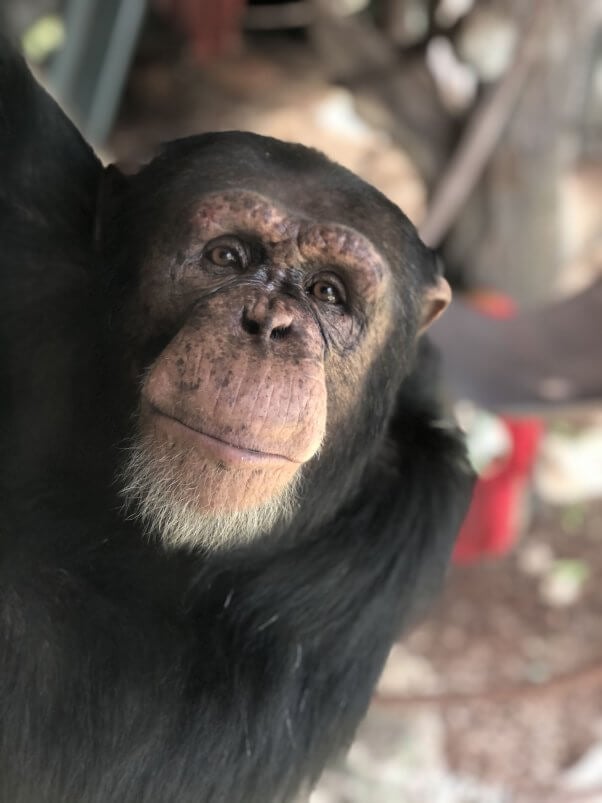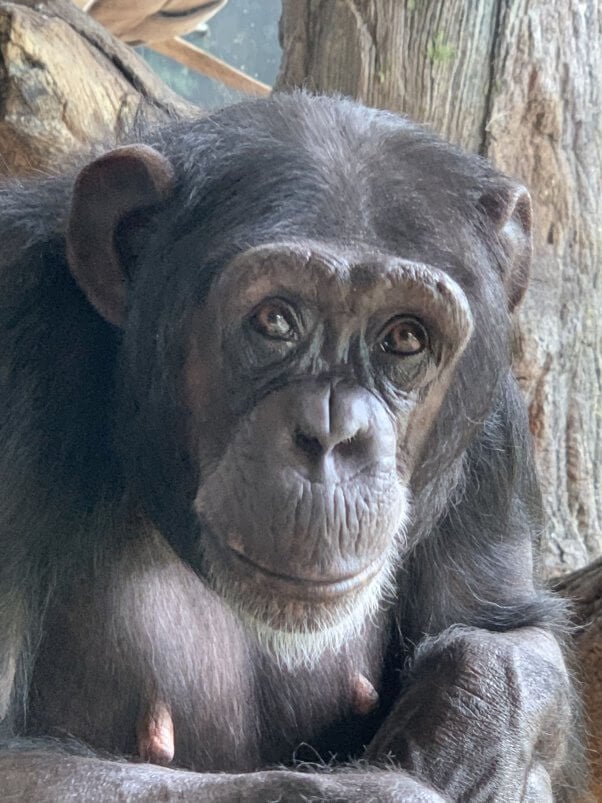A decade ago, there were at least a dozen chimpanzees working in Hollywood. Now there are none. And it’s all thanks to campaigns like PETA’s to get live great apes out of entertainment—and to the dedication of animal rights activists.
There are officially no more chimpanzees in Hollywood!
Last year, notorious exhibitor Steve Martin’s Working Wildlife dumped the last chimpanzees forced to appear in commercials and other Hollywood productions, including Eli and Susie, at Wildlife Waystation, a now-defunct pseudo-sanctuary near Los Angeles. The pair were considered useless to the industry after they’d grown too large.

During a May 2018 USDA inspection, officials observed a “[c]himpanzee perch with missing boards and cracks and grooves in remaining board.” When not being trucked around to gigs, chimpanzees like Eli and Susie were being held in this barren, hazardous training compound and others like it.
Although Eli and Susie were free from frightening sound stages and the behind-the-scenes beatings that they undoubtedly endured as “actors,” Wildlife Waystation (which in 2017 received an official warning from the feds after four chimpanzees escaped) wasn’t much better. But then the sham sanctuary shut down, and a search began for good homes for Eli, Susie, and the dozens of other chimpanzees left there. Currently, there isn’t enough space available at accredited, reputable sanctuaries for these chimpanzees—and this is where Lincoln Park Zoo (LPZ), an accredited facility in Chicago, came in.
 © Lincoln Park Zoo
© Lincoln Park ZooOn June 26, LPZ announced that it had welcomed Eli (pictured above) and Susie (pictured below) as permanent lifetime residents. There, the pair will receive the highest-quality care and have the opportunity to integrate into a larger social group of chimpanzees. They’ll live in an enriching habitat that provides for their species-specific needs and receive excellent veterinary care.
 © Lincoln Park Zoo
© Lincoln Park ZooLPZ’s Project ChimpCARE, PETA, and accredited chimpanzee sanctuaries worked hard to raise awareness of the plight of chimpanzees used in entertainment, including by leading specific campaigns in Eli and Susie’s behalf. LPZ’s chimpanzee experts conducted survey studies and conclusively found that the public has misperceptions about chimpanzees’ endangered status because great apes frequently appear alongside humans (often dressed in clothing) in movies, television shows, and advertisements. These studies helped push advocacy efforts—including our own—forward and persuaded corporations to pull scenes with chimpanzees and pledge never to use great apes in future productions.
Chimpanzee Fun Facts
Did you know that chimpanzees are more closely related to humans than Asian elephants are to African elephants? What about that baby chimpanzees stay by their mothers’ sides for four to five years? Or that males never leave the group they’re born into? Chimpanzees are truly fascinating animals. But as with all animals, that doesn’t make it OK to exploit them. Learn more about great apes, which include chimpanzees, and ways to show them compassion in one of the “best Animal Behavior books of all time,” Animalkind.
PETA campaigned against productions that used Eli and Susie, too, and scored multiple victories for the duo and other exploited chimpanzees. In 2015, after we sent a letter to MasterChef Junior’s judge and executive producer, Gordon Ramsay, explaining that chimpanzee “actors” are removed from their highly protective mothers shortly after birth, Ramsay agreed to pull footage featuring Eli from upcoming episodes of the hit cooking show. In 2016, GEICO’s ad agency signed our Great Ape Humane Pledge, agreeing to leave great apes out of its advertising. GEICO’s ad agency and MasterChef Junior both worked with Steve Martin’s Working Wildlife—an outfit that has been cited numerous times by the U.S. Department of Agriculture (USDA) for violating the federal Animal Welfare Act, including for failing to provide animals with adequate veterinary care and locking chimpanzees and orangutans in night housing for up to 18 hours a day.
In 2013, Bonobos removed from its website an ad that showed Susie cavorting in swim trunks—in its place, the swimwear and clothing company substituted a PETA video featuring Anjelica Huston speaking up for great apes. Similarly, after hearing from us about troubling chimpanzee-training methods that can include abuse delivered via fists, sticks, and clubs, Dodge pulled its own ad in which Susie appeared. Within the same month, two other companies pulled or altered ads with great apes in them, too, after being contacted by PETA.
Help us score more victories for chimpanzees!
There may be no more chimpanzees in Hollywood, but many are still being exploited at roadside zoos and other seedy operations. Chance, for example—who was stolen from his mother, shipped across the country when he was 6 months old to become a “pet,” and then sent to live in servitude to a notorious circus family known as the Rosaires—is still being used in a demeaning show at Big Cat Habitat, a pseudo-sanctuary that has also been cited by the USDA. Click below to urge the Rosaires to retire Chance to an accredited sanctuary, where he will never be forced to perform again and can get the care that he desperately needs:
Tell the Rosaires to Give Chance a Chance!
Next, ask American Greetings to stop using demeaning, clownish images of chimpanzees and other great apes on its greeting cards. Chimpanzees and orangutans, the apes featured most frequently on the company’s cards, are currently at risk of extinction—wild populations are dwindling because of habitat loss and the illegal pet trade. Just like Hollywood productions, greeting cards featuring great apes dressed in silly costumes and making funny faces promote disrespect for them and mislead the public into believing that they’re prevalent in nature when, in fact, they’re endangered. Urge American Greetings to join top stock-image agencies like Getty Images, Shutterstock, and Dreamstime in banning unnatural images of primates:
Urge American Greetings to Stop Exploiting Chimpanzees
The post Curtain Closed: There Are No More Chimpanzees in Hollywood appeared first on PETA.
Enviroshop is maintained by dedicated NetSys Interactive Inc. owners & employees who generously contribute their time to maintenance & editing, web design, custom programming, & website hosting for Enviroshop.
